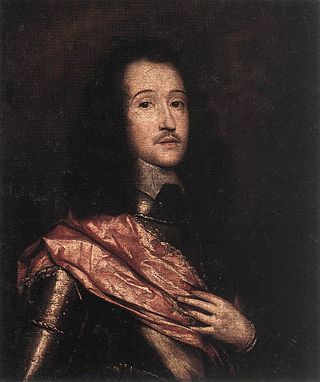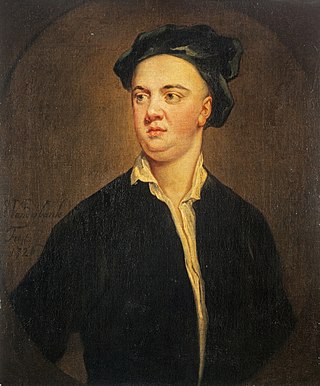Related Research Articles

Richard Lovelace was an English poet in the seventeenth century. He was a cavalier poet who fought on behalf of Charles I during the English Civil War. His best known works are "To Althea, from Prison", and "To Lucasta, Going to the Warres".

Allan Ramsay was a Scottish poet, playwright, publisher, librarian and impresario of early Enlightenment Edinburgh. Ramsay's influence extended to England, foreshadowing the reaction that followed the publication of Percy's Reliques. He was on close terms with the leading men of letters in Scotland and England. He corresponded with William Hamilton of Bangour, William Somervile, John Gay and Alexander Pope.

Scottish literature is literature written in Scotland or by Scottish writers. It includes works in English, Scottish Gaelic, Scots, Brythonic, French, Latin, Norn or other languages written within the modern boundaries of Scotland.

Hector Boece, known in Latin as Hector Boecius or Boethius, was a Scottish philosopher and historian, and the first Principal of King's College in Aberdeen, a predecessor of the University of Aberdeen.

James Thomson was a Scottish poet and playwright, known for his poems The Seasons and The Castle of Indolence, and for the lyrics of "Rule, Britannia!"
Nahum Tate was an Anglo-Irish poet, hymnist and lyricist, who became Poet Laureate in 1692. Tate is best known for The History of King Lear, his 1681 adaptation of Shakespeare's King Lear, and for his libretto for Henry Purcell's opera, Dido and Aeneas.

Robert Tannahill was a Scottish poet of labouring class origin. Known as the 'Weaver Poet', he wrote poetry in English and lyrics in Scots in the wake of Robert Burns.

William Alexander, 1st Earl of Stirling PC was a Scottish courtier and poet who was involved in the Scottish colonisation of Charles Fort, later Port-Royal, Nova Scotia in 1629 and Long Island, New York. His literary works include Aurora (1604), The Monarchick Tragedies (1604) and Doomes-Day.

Stephen Phillips was an English poet and dramatist, who enjoyed considerable popularity early in his career.

Henry Constable was an English poet, known particularly for Diana, one of the first English sonnet sequences. In 1591 he converted to Catholicism, and lived in exile on the continent for some years. He returned to England at the accession of King James, but was soon a prisoner in the Tower and in the Fleet. He died an exile at Liège in 1613.
Sydney Goodsir Smith was a New Zealand-born Scottish poet, artist, dramatist and novelist. He wrote poetry in literary Scots, sometimes referred to as Lallans, and was a major figure of the Scottish Renaissance.
Alexander Scott was a Scottish Court poet. He is believed to have spent most of his time in or near Edinburgh. Thirty-six short poems are attributed to him, including Ane New Yeir Gift to Quene Mary, The Rondel of Love, and a satire, Justing at the Drum. His poems are included in the Bannatyne Manuscript (1568) complied by George Bannatyne. According to an older view, "he has great variety of metre, and is graceful and musical, but his satirical pieces are often extremely coarse".
Rev John Logan FRSE (1748–1788) was a minister in Leith, Scotland, a popular preacher known also as a historian. Self-destructive behaviour saw him end his life as a hack writer in London.

The Scottish Renaissance humanist George Buchanan gave a long list of Scottish Kings in his history of Scotland—published in Latin as Rerum Scoticarum Historia in 1582—most of whom are now considered by historians to be figures of legend, or completely misrepresented. The list went back around 1900 years from his time, and began with Fergus I. James VI of Scotland, who was Buchanan's pupil, adopted the story of Fergus I as his ancestor, and the antiquity of the line was emphasised by the House of Stuart.

Literature in early modern Scotland is literature written in Scotland or by Scottish writers between the Renaissance in the early sixteenth century and the beginnings of the Enlightenment and Industrial Revolution in mid-eighteenth century. By the beginning of this era Gaelic had been in geographical decline for three centuries and had begun to be a second class language, confined to the Highlands and Islands, but the tradition of Classic Gaelic Poetry survived. Middle Scots became the language of both the nobility and the majority population. The establishment of a printing press in 1507 made it easier to disseminate Scottish literature and was probably aimed at bolstering Scottish national identity.

Scottish literature in the eighteenth century is literature written in Scotland or by Scottish writers in the eighteenth century. It includes literature written in English, Scottish Gaelic and Scots, in forms including poetry, drama and novels. After the Union in 1707 Scottish literature developed a distinct national identity. Allan Ramsay led a "vernacular revival", the trend for pastoral poetry and developed the Habbie stanza. He was part of a community of poets working in Scots and English who included William Hamilton of Gilbertfield, Robert Crawford, Alexander Ross, William Hamilton of Bangour, Alison Rutherford Cockburn, and James Thomson. The eighteenth century was also a period of innovation in Gaelic vernacular poetry. Major figures included Rob Donn Mackay, Donnchadh Bàn Mac an t-Saoir, Uillean Ross and Alasdair mac Mhaighstir Alasdair, who helped inspire a new form of nature poetry. James Macpherson was the first Scottish poet to gain an international reputation, claiming to have found poetry written by Ossian. Robert Burns is widely regarded as the national poet.

Scots-language literature is literature, including poetry, prose and drama, written in the Scots language in its many forms and derivatives. Middle Scots became the dominant language of Scotland in the late Middle Ages. The first surviving major text in Scots literature is John Barbour's Brus (1375). Some ballads may date back to the thirteenth century, but were not recorded until the eighteenth century. In the early fifteenth century Scots historical works included Andrew of Wyntoun's verse Orygynale Cronykil of Scotland and Blind Harry's The Wallace. Much Middle Scots literature was produced by makars, poets with links to the royal court, which included James I, who wrote the extended poem The Kingis Quair. Writers such as William Dunbar, Robert Henryson, Walter Kennedy and Gavin Douglas have been seen as creating a golden age in Scottish poetry. In the late fifteenth century, Scots prose also began to develop as a genre. The first complete surviving work is John Ireland's The Meroure of Wyssdome (1490). There were also prose translations of French books of chivalry that survive from the 1450s. The landmark work in the reign of James IV was Gavin Douglas's version of Virgil's Aeneid.
Events from the year 1826 in Scotland.
Events from the year 1721 in Scotland.
Marie Maitland was a Scottish writer and poet, a member of the Maitland family of Lethington and Thirlestane Castle, and later Lady Haltoun. Her first name is sometimes written as "Mary".
References
- McClure, J. Derrick. "Garden, Alexander". Oxford Dictionary of National Biography (online ed.). Oxford University Press. doi:10.1093/ref:odnb/10380.(Subscription or UK public library membership required.)
- National Library of Scotland